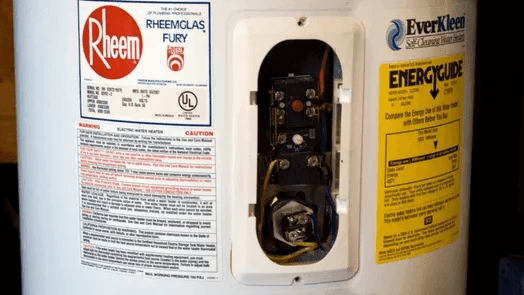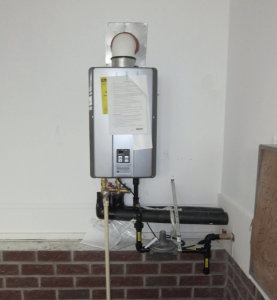
Water heating accounts for almost 20% of your home’s total energy costs. So when it’s time to replace a tank water heater, you might be considering converting to a tankless water heater.
However, when we get calls from customers asking for a quote to convert to a tankless, we tell them that—as of 2017—we don’t install tankless water heaters. The main reason being, we don’t recommend them.
Difference Between Tank and Tankless

First, here’s a quick explanation about the differences between these two types of water heaters.
Depending on the size, a tank water heater holds up to 50 or so gallons of water. That water is heated in the tank and used for showers, washing dishes, doing the laundry, etc. As the water in the tank cools and/or the tank empties, it continually reheats the cooled water and/or refills with cold water that then needs to be heated.
A good thing to know about tank water heaters is that over time sediment from the water sitting in the tank settles at the bottom. Over time this sediment builds up.
So as the years go on, it’s possible to have so much build-up that a 50-gallon tank will hold only 30 gallons. This is why manufacturers recommend draining and flushing the tank once or twice a year.
A tankless water heater uses an energy source—electric or gas—and heats the water “on demand.” There’s no tank, so no stored water.
However, a common misunderstanding about a tankless water heater is that it provides “instant hot water.” Unless you have a hot water recirculation pump installed, this is not the case.
Because freshwater systems always have water in them, if you haven’t turned on the hot water in a while, the water in the pipe has cooled. So the cooled water runs out first when you turn on the hot water.
What you get with a tankless water heater is endless hot water, not instant.
Why We Don’t Recommend Tankless
Electric vs. Gas
If your house is all electric with no ability for natural gas, forget it. It is our experience that electric tankless water heaters do not work well for whole house water heating.
Installation
When converting from a tank to a tankless the installation is the most important thing.

If the tankless water heater is not installed or set up properly, it will never work properly. As mentioned above, a tankless doesn’t have a tank so it heats water on demand. In order to heat the water on demand, significantly more natural gas is needed for the tankless.
Many people—including some plumbers—believe you can just swap out a tank for a tankless, and you are done. But this could not be further from the truth.
In reality, if the tankless does not have the correct amount of gas supply hooked up to it, it will not work properly. Ever.
The venting of a tankless is also completely different than a tank, therefore it requires changes during the installation process. And without the right venting, a tankless unit won’t run as efficiently as intended. This can shorten the lifespan of the unit.
Gas Supply
An important question to consider: does your home gas system supply enough gas to properly power a tankless water heater. Make sure you take into account all the other gas-powered appliances in your home. If not, there is no way to properly install a tankless.
And another major concern is will the average plumber spend the time to figure this out before installing the tankless? Our answer is no!
Price
The average cost of just the tankless water heater itself is 2 to 3 times more than a tank water heater.
Then add the cost of installation and converting everything properly by a company with enough experience and a great reputation with tankless. You’re now looking at least 3 to 4 times more than replacing and reinstalling a tank water heater.
Environmentally Friendly/Utility Savings
Because tankless water heaters heat on demand, you save on utilities making it environmentally friendly. However, the amount of utility savings over the life of the tankless will never even come close to the extra money paid.
Lifespan and Ongoing Maintenance
A tankless water heater will only last as long as a regular tank water heater before it has to be replaced.
Now to be fair, the replacement should not cost as much as the initial installation/conversion—as long as the replacement uses the same gas supply or less than the converted one. But it absolutely will be more than a tank water heater.
Another important thing to keep in mind is the extra yearly maintenance a tankless water heater needs for it to continue working properly. And this maintenance must be done by a certified tankless specialist.
When We Might Recommend a Tankless

Building a new home. If you’re building a new home, it might not be a bad idea to install a tankless.
A new home can be built specifically to the tankless. This means less up-front costs for the materials, labor, and installation compared to converting a home built with a tank.
However, we think there’s another really good option when building a new home. Instead of using a tankless water heater, build a room in the house for the tank water heater where the slab slopes to the outside. Then if the tank water heater breaks, there is no possible damage inside the house.
Not to mention, using a tank water heater is cheaper in the long run when you consider the overall costs of a tankless.
Gimmicky Products and Services
Here at In-House Plumbing, we don’t recommend products or services we won’t use or install in our own homes. And at the time of this writing, we would not install a tankless water heater in our own homes for the reasons above and therefore can’t recommend them to our customers.
Tankless water heaters are certainly growing in popularity. But the truth is everything about how these are pushed and sold to the marketplace is a gimmick. It is designed to make manufacturers and installers a lot of money while not helping the customer at all.
But, if you still want a tankless water heater, we recommend you do your homework.
Research. Research. And research some more to find the right installer. We promise you, the right installer will not be even close to the cheapest.
When you find a reputable and experienced installer, protect yourself and your investment. Check with the manufacturer about everything the installer does. And try to get an installation contract that allows you to try it for a week to a month before you pay the final amount. We also have a guide that we think it can help you find a trustworthy plumbing company.
Most Importantly: Be Careful
We hope this information has helped. If you have any questions, comments or concerns, please feel free to contact us at 972-494-1750. Or email us at service@inhouseplumbingcompany.com.

